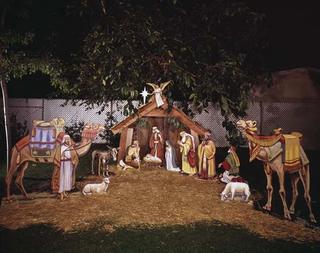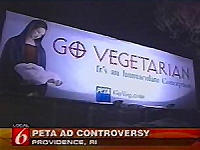[For the audio version of this homily, click here: Holy Family 2003]
Some people say that the Church needs to catch up to the world. I’ve often said that just the opposite is true: the world needs to catch up to the Church—and that’s true in particular when it comes to issues relating to family life!
Here’s a case in point. What I’m about to read to you is not taken from a Catholic publication; it’s not taken from any “religious” publication. It’s from a recent issue of National Geographic magazine. It has to do with current population trends in Europe. The news, unfortunately, is not good.
The title of this little piece is: “Europe’s Baby Bust.”
France began awarding medals for childbearing women of “good character” after World War I to restore its devastated population. Today again in need of more children, France has relaxed its medal rules: The mothers don’t have to be married; they don’t even have to be French.
But it will take more than medals to stop the sharp population decline in most of Europe.
According to the UN, Europe’s population will shrink by more than 90 million people in the next 50 years, roughly twice the number killed worldwide during World War II. For more than two decades the total fertility rate—the average number of children each woman will bear in her lifetime—has remained below the 2.1 level required to replace the population.
Finally, five years ago, Europe’s population began to fall. Now demographers are abandoning their assumption that the fertility rate will return to replacement level in the near future.
“It’s a monumental change,” says Joseph Chamie, director of the United Nations Population Division.
And one that may not be limited to Europe. Many demographers predict that global fertility rates will follow Europe’s lead and that the world’s population could decline by the end of this century—a trend unseen since the 14th century Black Death.
Among the first nations to experience the population implosion will be historically fertile Italy. With births below replacement level since 1977, Italy is projected to lose nearly a quarter of its current population by 2050.
What accounts for quieter nurseries in Italy and the rest of Europe? Contraceptive use is at record levels, and women are earning more college degrees than men, leading many to seek careers first and families second—if at all. Couples who do start families are waiting longer to have their first child.
Without babies to replenish the labor force and pay taxes, Europe will be hard-pressed to fund the pensions of longer living retirees. To stay in the black, governments will need to take unpopular steps, such as raising the retirement age, cutting benefits, hiking taxes, and increasing legal immigration. Says Chamie: “There’s no way out of the demographic box.”
Scott Elder wrote this little article for National Geographic.
I do appreciate Mr. Elder’s honesty; but, unfortunately, he’s not being completely honest with us in his predictions for the future. He says that in order to stay in the black, governments will be forced to do unpopular things such as: “raising the retirement age, cutting benefits, hiking taxes, and increasing legal immigration.”
But there is one very important item that he left off his list: killing the elderly and the terminally ill.—“Grandma, we know you’re sick and that you could live a few more years with the right medicine; but, quite frankly, we don’t have the money to pay for it. Neither does the insurance company. You see, there aren’t enough working people putting money into the fund anymore. So we can’t keep you around, grandma. Sorry. Hope you don’t mind.”
Mark my words, my brothers and sisters! The so-called “Right to Die” movement in this country (and in other places) will one day become the “Duty to Die” movement, and they will press very hard for mandatory euthanasia. They will say it’s necessary because there are too many old and sick people around, and not enough money available to provide for their medical needs. And given the proclivity of Americans to vote their wallets and pocketbooks—and not their consciences—it’s highly likely that these death-dealers will win the day politically!
You see, the world did not listen—and is not listening—to the Church on the issue of artificial contraception, and now some nations are contracepting themselves out of existence, and opening the doors to evils like mandated euthanasia!
When it comes to issues which relate to family life, we need to submit ourselves to the wisdom of the Church—because the Church speaks with the voice of Jesus Christ, and Jesus is the ultimate authority on the family!
After all, he’s been part of one for much longer than any of us have. And here I’m not talking about the Holy Family, I’m talking about the Blessed Trinity! The Trinity, in a very real sense, is the original Family!
Consequently, the love between the 3 Persons of the Trinity is to be the inspiration and the model for the love we show to one another in our earthly families.
Now that’s not my clever idea, that’s the teaching of the Church! As it says in paragraph 2205 of the Catechism, “The Christian family is a communion of persons, a sign and image of the communion of the Father and the Son and the Holy Spirit.”
This means that before he came to this earth and was born of the Virgin Mary, the Son of God lived in a bond of perfect familial love with the Father and the Holy Spirit.
Of course, when he was born into an earthly family on Christmas Day, he brought that love with him. It’s the love that made him selfless, and patient, and forgiving—and obedient to his parents (as St. Luke tells us he was in today’s Gospel text).
Please hear that, young people!
I was in the 5th grade classroom at St. Pius X School the other day and the children were asking me about Jesus’ life from the time he was born until he began his earthly ministry at age 30. They said, “Fr. Ray, what do we know about Jesus when he was our age?”
I said to them, “Well, the Bible records only one incident from Jesus’ early years: his finding in the Temple at the age of 12.” “But,’ I said, ‘that’s okay, because in that one scene we’re told everything we need to know about Jesus’ youth, his adolescence, and his young adulthood: he was obedient to his parents! That’s all I need to know—and that’s all you young people need to know! Just be obedient, like Jesus!”
They really weren’t too happy about that answer—because obedience isn’t always fun. But it’s essential for peace in a family!
Just think of how much unhappiness comes into our families because of disobedience. I was at my sister’s the other night in Barrington, and my nephew Nicholas—who just turned thirteen—had a typical teenage fit when his parents asked him to do something he didn’t want to do. And for a while, there was no peace in the house.
I’m sure you can all relate! (Those, by the way, are the moments when my married sister comes to me and tells me how wonderful celibacy is!)
Jesus, through his Church, gives us the blueprint for peaceful, strong, healthy families—which is actually the blueprint for a peaceful, strong, healthy society, since (as the Catechism tells us), the family is “the original cell of social life.” As the family goes, so the culture goes.
For example, the contraceptive mentality—which is currently present in many individual families—is now having a devastating effect on societies and cultures all over the world. That was one of the clear messages contained in the National Geographic article I read to you a few moments ago.
The blueprint of Jesus and his Church for a strong family life includes the obedience of children, and the teaching given to us in today’s second reading from Colossians 3. There St. Paul writes, “Put on . . . heartfelt compassion, kindness, humility, gentleness, and patience, bearing with one another and forgiving one another.”
Those are some of the virtues necessary for peace and harmony in any setting, but especially in the family!
Now, in case you haven’t figured it out yet, those virtues are much easier to talk about than they are to live out. Being compassionate, humble, forgiving, etc. requires a great deal of personal sacrifice and effort.
But the good news is that we don’t have to do it alone. Jesus Christ is there to help us—especially through the sacraments—to live these necessary virtues. Of course, we need to be open to this grace when it comes to us, and we need to freely cooperate with it.
On this feast of the Holy Family, it’s important for us to remember that Jesus, Mary and Joseph did not have an easy life together. They were poor; they were refugees for a time; they were even pursued by a lunatic king who would have killed them all if he had had the chance.
But even though they faced many storms on the outside, because of the virtues they possessed on the inside they lived in peace with one another—and that made them a “holy” family.
In the midst of the storms our families face, we can have that same peace, if we follow the wisdom of the Church and not the false wisdom of the world.
Lord Jesus, help us to do that today and every day. Amen.



